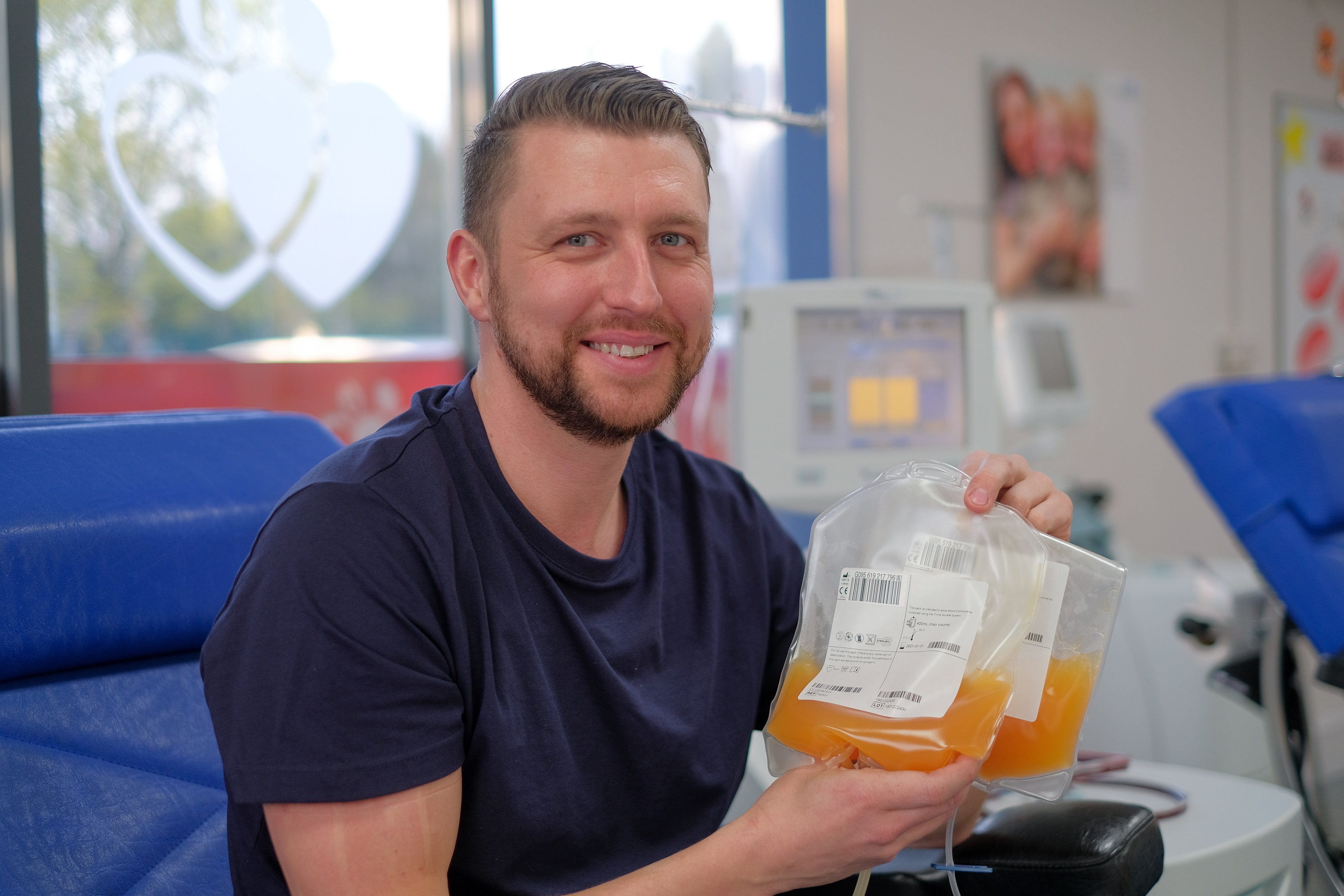Platelet donation
Find out more about switching to platelets
How one donor made a big difference
Pete Lock began donating blood in 2013. He can’t remember why he started, he knew it was a good thing to do and donated when he could. However, after donating for a few years, sadly Pete lost his step mum, Lynne, to cancer. Pete said, “The whole family were heartbroken and helplessly frustrated that we couldn’t help her.”
Then, a few months later, Pete was hit with more bad news. His father-in-law, Paul, who had been a regular blood donor for over 30 years, was diagnosed with bowel cancer. Paul had been referred to his GP for further checks after failing the iron test while trying to give blood on Christmas Eve in 2014. It would have been his 89th donation.
Pete said, “That week I gave blood and asked if I could be tested to see if I was suitable for donating platelets. I knew it was too late to help Lynne, but I wanted to see if I could do anything to help Paul or anyone else who was suffering from this awful disease.
“A couple of weeks later I got the call to say I had special golden blood and that I could become a platelet donor.” What Pete means is, his blood had sufficient platelets to make him a suitable donor!
Thankfully, due to the cancer being caught early, Paul was able to have surgery and the cancer was removed within weeks. However, this meant that Paul could no longer donate blood. He was disappointed as it had been a goal of his to reach 100 donations.
Determined to do something to help, Pete and his partner, Jacqueline, rallied the troops and put together a group booking where they asked for 12 people to step up and donate, making up the 100 units of blood Paul had hoped to donate.
They named the group ‘A bloody good cause’ and shared with family and friends. The response was phenomenal with over 200 people coming forward and agreed to donate in Paul’s name. NHS Blood and Transplant held a blood donation session in a local centre and friends and family came all day to donate in Paul’s honour.
Since switching to platelet donation Pete has been truly committed. He has now donated over 200 units and plans to donate for as long as possible.

He adds, “donating platelets is a lovely experience; an hour’s peace and quiet (away) from the kids plus free biscuits and endless brews are just some of the perks! But seriously, apart from my children, it is my proudest achievement.
“The staff are lovely and it is great to feel part of something so important. The texts I receive letting me know which hospital my blood has gone to put a smile on my face. Not a lot of things in life can give you that sense of helping someone and it is a great feeling.
“Sadly, I know from experience how cancer can touch so many lives. I recently also lost a friend to the disease. He was such an inspiring and positive person, I used to send him pictures of when I was donating; he used to enjoy hearing about my appointments and appreciated the fact that people took time out of their day to give blood.
“I now donate in memory of him. It is frustrating to see loved ones affected by cancer and not being able to help but I hope donating platelets and raising awareness is a way of making things easier for these patients.
“I would encourage anyone to try donating platelets. The staff in Manchester make it such a nice experience. They are all welcoming and friendly and the care and attention they show proves it is more than just a job to them.”
Platelets are tiny gold-coloured cells in your blood, made in your bone marrow, which help it clot and stop bleeding.
After an injury, if one of your blood vessels gets damaged, it sends out signals to the platelets. The platelets then rush to the site of damage where they grow sticky tentacles that help them adhere to one another and form a clot. They also send out chemical signals to attract more platelets.
Platelet transfusions can help people with cancer and patients who’ve lost a lot of blood after an accident, organ transplant or surgery.

Platelet donations take place at our donor centres where we have specialist platelet machines. Whole blood is taken from the donor, the platelets are extracted, and the red blood cells and other blood components are then returned back into the body.
The whole process can take up to 2 hours (NOTE: video was taken before COVID-19 pandemic)
Platelets help different patients
To find out more about how to become a platelet donor, please visit our website https://platelets.blood.co.uk/
We like to hear stories about donors who have switched to platelet donation. If you would like to help share your experience or story contact us via email Contact.platelets@nhsbt.nhs.uk.